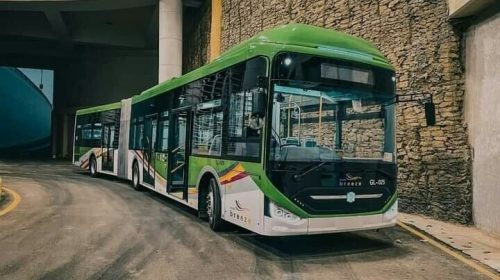ISLAMABAD: The World Bank has rated the overall implementation progress of the “Karachi Mobility Project” worth $382 million, as moderately unsatisfactory.
The bank’s official documents revealed that the effective date of the project was November 26, 2019, however, only $18.88 million i.e. 4.9 per cent of the total $382 million was disbursed so far.
The implementation of the project has accelerated, especially following the hiring of the project management’s core team. Recruitment of additional staff to support the Sindh Mass Transit Authority (SMTA) and public-private partnership (PPP) transaction service is planned, to encourage female applicants. The appointment of a Utility Coordination Committee has supported implementation under Component 1 which supports the development of the Yellow Corridor. The committee has started to consult on the technical aspects of the relocation of utilities in the BRT corridor with different stakeholders.
World Bank report says 15,000 buses needed for Karachi’s transport system
The bank stated that bus user satisfaction survey is at the procurement stage. On December 5, 2023, the SMTA issued the request for proposals (RFP). The contract will be signed by late February 2024 and the work will start on March 20, 2024. The scope of work includes women and transgender groups.
Project documents noted that the development objective of the Karachi Mobility Project for Pakistan is to improve mobility, accessibility, and safety along selected corridors in Karachi.
The project comprises three components. The first component, urban road infrastructure – yellow corridor includes: (a) rehabilitating or reconstructing road infrastructure (including improving and shifting related utilities such as street lighting, sewer or water supply, drainage, oil pipeline), bridges and non-motorized transport facilities (such as motorcycle lanes, footpaths, and pedestrian crossing) along the yellow corridor and its direct and feeder service routes; (b) implementing environmental and social recommendations and mitigation measures before and during construction; and (c) carrying out detailed designs, construction supervision activities and third-party monitoring.
The second component, the development and operationalisation of a bus rapid transit (BRT) system – yellow corridor includes: (a) constructing and equipping bus rapid transit facilities (including segregated busways, interchange facilities, stations, terminal, and depots) along the yellow corridor; (b) providing working capital subsidy for the concession of the BRT operation for the yellow corridor; (c) implementing social management and impact mitigation measures including the labor redeployment for the affected existing bus operators such as drivers, conductors, and route managers; (d) implementing and monitoring the social management plan including its actions to mitigate gender based violence and actions to improve women’s mobility and economic participation options; (e) designing a transit-oriented development strategy for the yellow corridor; (f) providing public private partnership (PPP) transaction advisory services for BRT operation concession; and (g) carrying out a program of regular engagement with key stakeholders; and implementing a public relations and media strategy to generate support for and disseminate information on the BRT system. The third component, capacity building and technical assistance includes: (a) supporting project management and providing technical assistance for the implementation of social measures; (b) provision of technical assistance in traffic management and road safety; (c) supporting the regional transport authorities in automating the management and monitoring of bus route permits; and (d) carrying out capacity building activities to strengthen SMTA and support the consolidation and improvement of the management of the urban transport sector in Karachi.






